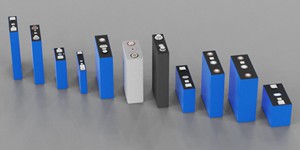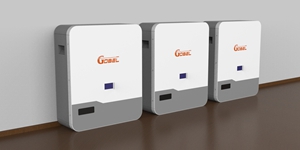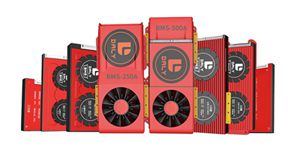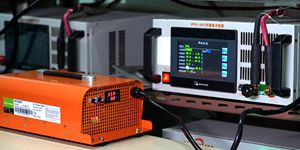CATL WON A LARGE OVERSEAS 10GWH ENERGY STORAGE ORDER
By Kelly posted 2022-10-03 13:07:45According to the official Wechat news of CATL, on September 21, CATL announced that it has reached a cooperation agreement with FlexGen, an American energy storage technology platform and solution provider, to supply the latter with 10GWh of advanced energy storage products within three years.
According to reports, CATL will supply FlexGen with the containerized liquid-cooled energy storage product EnerC. The energy density of EnerC can reach 259.7kWh/m2, which is nearly twice that of the traditional air-cooled system.
In 2021, CATL and FlexGen will install two 110MWh lithium battery energy storage systems in Texas, USA. In addition, FlexGen has just been designated as an authorized service provider of CATL to provide maintenance and optimization services for CATL's battery energy storage system.
At present, the cooperation between CATL and FlexGen in energy storage system projects has exceeded 2.5GWh.
According to the data, FlexGen is an American energy storage technology company founded in 2009. is the developer of the FlexGenHybridOS energy management system that automatically dispatches energy storage, renewable energy and conventional generation to provide enhanced capacity and reduce energy costs.
CATL said that the deepened cooperation with FlexGen and the latest supply agreement will help CATL to supply important equipment for energy storage projects in North America and accelerate its development in the North American market.
The overseas layout of the energy storage business of CATL
The rapid rise of the CATL benefits from the rapid development of the new energy vehicle industry and the inclination of national policies. According to relevant statistics, from 2014 to 2021, the total operating income of CATL increased from 867 million yuan to 130.36 billion yuan, an increase of nearly 150 times.
Before 2019, CATL had been criticized for being too dependent on the domestic market. At that time, overseas revenue only accounted for 4.73% of the total revenue. With the introduction of overseas policies related to new energy, CATL has accelerated the pace of overseas layout. CATL has successively established a number of R&D centers and production bases in the United States, Germany, France, and Japan.
For cooperation in overseas markets, CATL mainly cooperates with inverter manufacturers, and also has in-depth cooperation with the top ten international energy storage customers such as Nextera, Fluence, Wartsila, and Tesla.
In March 2019, CATL signed a cell supply contract with Powin Energy, an American energy storage plant, for battery energy storage systems. CATL provided Powin Energy with 1.85GWh cells, mainly lithium iron phosphate cells.
In July 2019, CATL and KSTAR jointly established CATL KSTAR, holding 51% of the shares, focusing on the field of energy storage.
In February 2020, CATL signed a supply agreement with Tesla to provide Tesla with lithium-ion power battery products.
In April 2020, the joint venture energy storage equipment manufacturing project between CATL and KSTAR officially started, with a total investment of 1 billion yuan.
Until 2021, the total profit of CATL in overseas markets will reach 27.87 billion yuan, accounting for 21.38% of total revenue, a year-on-year increase of 252%, much higher than the domestic 142%.
It is worth noting that the road of overseas expansion of CATL is not a smooth one. In March of this year, Bloomberg reported that CATL plans to invest $5 billion in the United States to build an 80GWh power battery factory with 10,000 employees to supply Tesla.
But in April of this year, the US President launched the Defense Production Act, and in early August, the US Congress passed the Chip and Science Act. Then on August 4, it was reported that CATL had suspended the construction of factories in the United States, which also meant that CATL’s plan to expand in North America was temporarily put on hold.
Domestic trouble of CATL
Since the beginning of this year, the stock price of CATL has fallen by more than 29%, and the market value has evaporated by more than 430 billion yuan. Especially on September 16, the market value fell below the trillion mark, causing heated discussions. In the field of power batteries, CATL is facing extremely strong competition. Companies such as BYD, Funeng Technology, and Sunwonda are all growing very rapidly in the field of power batteries.
Zeng Yuqun, chairman of German Times, also said: "The capital hype of upstream raw materials has brought short-term problems to the power battery industry chain. The prices of upstream materials for lithium batteries such as lithium carbonate, lithium hexafluorophosphate, and petroleum coke have skyrocketed."
However, the CATL is no longer satisfied with being limited to the field of power batteries.
According to the financial report for the first half of 2022, the revenue of the energy storage business of CATL in the first half of 2022 reached 12.736 billion yuan, an increase of 171.41% over the same period of the previous year, which was higher than the growth rate of power batteries.
At the beginning of this month, CATL and Sungrow reached a strategic cooperation to jointly develop the global integrated photovoltaic storage market. The two parties will expand cooperation in energy storage system product innovation and global application, and jointly promote industrial synergy.
A few days ago, CATL and GCL Group signed a long-term strategic cooperation agreement. The two parties will leverage their respective advantages to accelerate the effective integration of the two major applications of "photovoltaic + energy storage", and comprehensively promote the rapid implementation of the large-scale project integrating source, network, load and storage.
In addition, in July this year, CATL also released sodium-ion batteries, which are expected to be fully mass-produced in 2023. It is understood that the energy density of the first-generation sodium-ion battery cell of CATL has reached 160Wh/kg, which is the highest level in the world at present, and 80% of the power can be replenished by charging at room temperature for 15 minutes, giving the battery fast charging capability.
CATL said that its next-generation sodium-ion battery is expected to exceed 200Wh/kg in energy density.









